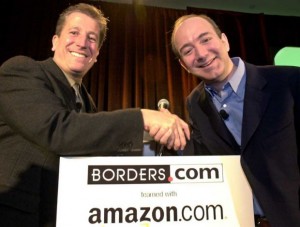Okay, first of all, I know I’m late. But this could have been next September so what are you complaining about? Second, yeah, I know that title is writing a little more than I can cash. Third, I totally believe it to be true.
There’s been a recent upheaval in the publishing community as it realizes that independents are on the rise and eBooks are taking a great deal of the wind out of the sails of the traditional book. Some people have embraced this and have decided that this format and this movement needs all the support it can get. But, in my opinion, it’s not nearly enough.
For a long time there’s been a stigma around the idea of the independent author. They’re shut out of most of the writing unions and guilds, they rarely qualify for any of the award ceremonies and getting your work reviewed by a professional can be troublesome and requires some doing. Then, after all of that, if they happen to be a big hit they aren’t acknowledged until someone signs to publish more of their work. Up until that point you’re not just excluded from the industry – some might blame you for the recent decline in sales. In no other industry is someone treated like a leper for striking it out on their own as much as they are in publishing.
The music industry has embraced several independent talents over the years. Hell, in recent years that seems to be their lifeblood. The film industry devotes entire festivals to their independents. But authors? You better hope you don’t ever need someone to piss on you if you get set on fire. Not only will they not do it but the only liquid that might get tossed on the flames is a little of the stuff they’ve been passing off as water.
In the recent years, this has been invariably tangled up with the eBook debate. The prices are too low, there’s too many books on the market, the industry is being bottomed out and people just aren’t supporting it anymore! But let’s face it people: the real threat is that eBooks make it easier for independents to print what they want to print. Back in the day it was frowned on if you went to a vanity press. Why? Well generally because there were no checks and balances on the people publishing and anything could get through.
And you know what? That made sense back then. I’m the first to admit that there’s currently a lot more crap than gems in the independent markets. But at a certain point you have to wonder what exactly the industry is useful for anymore besides promotion. In the past, Twilight would have been printed by a Vanity Press. It lacks polish, is hated by the people who would have originally been considered the audience and was written by a complete unknown. Instead, it proudly sits by other traditionally published “novels” like the Kardashians’ “Dollhouse”.
Yeah, you saw that right. This is sold as FICTION. The Kardashians, by way of this being a novel, are eligible to be considered “writers” in the eyes of the industry and the community. Sure, it was likely ghost written and no one in the industry will take them seriously. But as far as tradition holds, they’re worthy of more respect than someone who’s willing to risk their ass on publishing their own work and stepping around the system.
Now, let’s step back for a moment and consider this. I’m not saying the whole industry and every publisher is defunct. I’m not even saying that the publishers that published things like Dollhouse and Twilight are defunct. What I am saying is that independents are the path to saving the industry because right now the industry has some key problems and those problems can be corrected by a thriving, celebrated independent market in the same way films and music have done in the past.
But we aren’t doing it nearly fast enough.
A wise man once said, “Insanity is doing the same thing over and over again and expecting different results.”
And yet we writers are in an industry which, for the most part, is trying very hard to do the insane thing. They want to increase their sales but argue against increasing their exposure by opening alternatives. They want to decrease overhead but argue that they need to keep doing things the same way. Some professionals in the industry still resist e-mail submissions because, somehow, this is more of a hassle than being buried under a mountain of paper when their slush-pile takes a life of its own.
Though, to their credit. Some professionals have actually gone in the opposite direction and will now only accept e-mail. These people deserve to be recognized because they figured out how to adapt. And, really, adaptation is the mark of someone who understands history.
There’s a proven history in business that the businesses which fail to adapt are the ones which eventually collapse. It’s not that this is something which can somehow be willed past. This is a fact of capitalism: If you don’t meet the demands of the customer then you have no customers anymore. But we’ve seen the great sins that have come from this and have watched seemingly powerful establishments of the book world cave-in under their own weight. Really, look no further than Borders to see just how true this is.
When Borders recently fell apart and other bookstore chains happened to stay intact, one of the insiders pointed out that Borders had essentially written off their digital market and was slow to adapt to changes in technology. They’d invested too heavily into CDs, failing to notice the rise in MP3. They invested in everything too heavily, especially in real estate which turned out to be a disaster for them. Their brick-and-mortar stores were costing them a fortune due to bad leases. But the one thing they decided not to invest too heavily in was their online presence.
Because it technically didn’t exist.
Not only had they entered the e-commerce market late (and took a beating for it) but they weren’t dedicated to it in a way that would benefit them once they did get there. In fact, after trying for only three years to capture a piece of the online retail sales, they went to a company which would turn out to be their greatest competitor and handed them the entirety of their online presence. Who was that company?
Oh…right. I’m sure those guys didn’t benefit at all from that deal at all.
But here we sit, knowing the things we do and yet watching the industry fail to make a real effort to actually resolve the problems in front of them. It’s not their fault, exactly. They’re doing what’s always worked in the past. But as we can see here from a video put together in 2009:
Times are changing… and that shit doesn’t work anymore.
Tomorrow, I talk about the first problem facing the industry lacking in indies and eBooks. Seriously, tomorrow (since it’s already written). In the meantime, go support an indie. I need the ramen.












